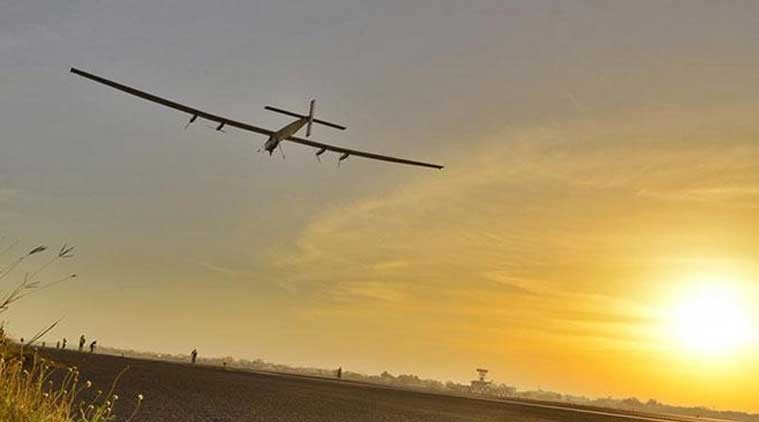
New Delhi, March 18 (IANS) The entire nation is excited about the Solar Impulse aircraft, powered solely by the sun's energy that landed in Ahmedabad on March 10 night and took off on Wednesday for its next leg to Varanasi on its global flight. But have we ever thought of what the pilots are eating while on this special flight?
Nestle scientists have spent four years working closely with the Solar Impulse project to develop a range of meals and snacks that can withstand extreme variations in temperature and climatic conditions and give the pilots the proper energy and protein content to cope with tough physical conditions, a company statement said here.
"The meals are tailored to the preferences and needs of the pilots, offering them some comfort and reward on their journey. In addition to the specially designed food and drinks the pilots will be supplied with Nestle bottled water and Nescafe soluble coffee," it said.
The flight is expected to take around five months, consisting of multiple stop-overs in locations including China, India and the United States, spanning 35,000 kilometers and some 500 hours of actual flying time.
"We are proud that Nestle is part of this ground-breaking journey. Nestle Research has developed food that resists extreme conditions and provides the right levels of nutrition, which is essential for the mission to be a success," Sanjay Khajuria, senior vice president for corporate affairs at Nestle India Ltd, said.
"The right food and nutrition are critical to the success of our mission, sustaining us for the long journey around the earth. We have benefited from the scientific expertise and experience of the scientists at Nestle Research who have developed meals specially tailored for us. By working closely with the team, we also know that we'll enjoy meal times - providing some comfort in such an extreme environment," pilots Bertrand Piccard and Andre Borschberg said.
Solar Impulse's unprecedented mission brought with it unprecedented challenges. Food and water for a week will be carried on board, but weight is a key factor in the mission's success.
"There is only limited space on board to exercise given the very small cabin - the daily intake for the pilots is 2.4 kg of food, 2.5l of water and 1l of sports drink per day, during the longest legs of the flight," the statement said.
The nutritional programme is personalised, with a nutritionally adapted dietary plan for each pilot, aimed at coping with extreme environmental conditions. The programme is also designed to be sustainable and rewarding for the pilots.
Corona's havoc: CS Foundation and Executive exams will not happen in June, read this order
The Institute of Company Secretaries of India has decided to postpone the ICSI CS exam in June 20
This was Sunita Williams' first reaction after returning to Earth, NASA released the video.
Astronaut Sunita Williams has returned to Earth. After spending 9 months and 14 days in space, Su
The country is once again witnessing an increase in corona cases. On Friday, a decrease of 4 thou
8th story from New Delhi. (Bhanwar Jangid). Within two months of the lockdown, Delhi's heartbeats
MI vs DC: Mumbai dashed Delhi's hopes, reached the playoffs; After Suryakumar, Santner-Bumrah shone
Mumbai Indians defeated Delhi Capitals by 59 runs. With this, Mumbai became the fourth team to re
Pakistan-China part shown to Kashmir-Arunachal, WHO issued a disclaimer on India's objection
The government has strongly raised the issue of the wrong map of India on the website of the Worl
Uma Nath Singh sworn in as Meghalaya HC chief justice
Shillong, March 19 (IANS) Justice Uma Nath Singh was on Thursday sworn in as chief justice of th
GST: Rs 1,48,995 crore GST collection in July, 28% increase over last year
GST collection of Rs 1,48,995 crore has been done in July. This amount is 28 percent more than th
Sachin Thapan, the mastermind of Punjabi singer Sidhu Moosewala murder case, has been arrested in
Imran Khan wants to do TV debate with PM Modi, said- crores of people will benefit
Pakistan's Wazir-e-Azam and 'Byanveer' Imran Khan have given a new statement. He said he would li